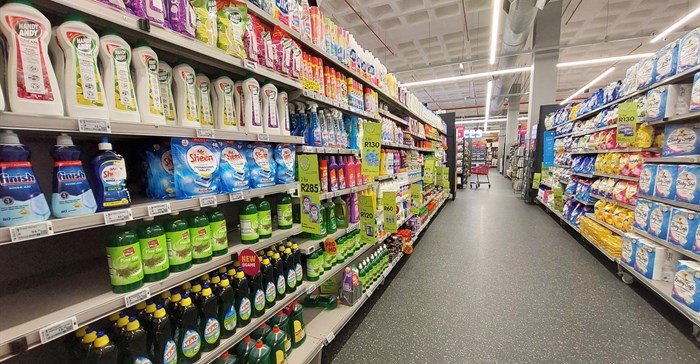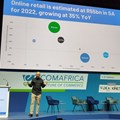
Image supplied. Despite shifting shopper behaviour due to tough economic conditions the FMCG retail sector remains the jewel in the South African economy crown
The fact is that the pedal of consumer spending power hits the metal of the macroeconomic conditions of the day in the South African consumer goods retail environment.
How consumers are doing – their employment levels, their indebtedness or appetite for credit, their disposable household income, their confidence in their ability to make ends meet – is deeply affected by a range of macroeconomic variables, such as food and fuel prices, the lending rate, GDP growth, overall inflation, which determine how and where they will shop.
This, in turn, affects how the retailers are doing. It tests the effectiveness of their strategies and determines their pricing and promotional approaches.
Trade Intelligence head of research, Caroline Short, says that the conditions we are seeing today are unprecedented. “From record unemployment to high inflation, broken supply chains, and load shedding, our industry is stretched to breaking point. But the miracle here is that shoppers and retailers are somehow managing to adapt.”
Brand and retail loyalty declines
As increasingly cash-strapped shoppers seek value above all else, their loyalty has declined to both brands and retailers. The average South African now shops across two or three retail stores to buy their monthly groceries, and more than 60% of shoppers have switched to cheaper brands.
Private brands are increasingly popular, with 24.7% of the average grocery basket value being represented by them.
Reduced shopping trips and larger basket size
The trend towards reduced shopping trips and larger basket size – which was reversed for a while after the pandemic – has emerged again, where shoppers plan their shopping trips with greater thought, struggling with reduced disposable income.
Basket value has declined, however as basket composition is now highly focused around grocery and household essentials, and staple foods. Impulse buying has also declined.
Gavin Lomberg 28 Mar 2023 Shifting shopping patterns
Shopping patterns have also shifted. For example, traditionally the highest FMCG retail revenue was generated in the last week of the month, around pay day.
Now, the highest retail turnover comes in during the first week of the month, when, post-pandemic, over 12 million South Africans receive their SASSA grants.
As South Africa’s electricity crisis deepens, shopper foot traffic has shifted away from smaller independent stores to stores that have generation capacity, i.e. typically mall-based stores.
Rising fuel prices are also motivating shoppers to opt for malls where they can visit multiple stores to answer their varied needs.
Retailers adapt strategies to the environment
In this tough environment, South Africa’s established corporate retailers – Shoprite, Pick n Pay, Woolworths, Massmart, and Spar – have each adapted their strategies to meet the changing needs and demands of shoppers.
All of them are investing heavily to keep the lights on – or at least the fridges running. Shoprite, for example, while installing renewables in many of its stores and all its distribution centres, is also forced to spend around R1bn per month on diesel for its generators.
Massmart’s Makro is offering installation and financing to shoppers who buy their home solar products there.
Rationalised and diversified store portfolios
Most of the major retailers have both rationalised and diversified their store portfolios.
This includes closing down underperforming brands as Massmart has done with DionWired, exiting difficult geographies as both Pick n Pay and Shoprite have done in East Africa, and extending into more defensive categories like baby (Checkers, Clicks, Dis-Chem) or clothing (Shoprite Group, Pick n Pay).
Home delivery is now a must-have as shoppers across the economic spectrum increasingly demand the security and convenience of this channel.
Promotions: the most challenging area for retailers
“Perhaps the most challenging area for retailers is in promotions, where the old strategies no longer work,” says Short.
Low-income shoppers are buying smaller, more affordable pack sizes – although some shoppers band together, stokvel-style, to buy bulk packs that offer the best value per unit.
And higher-income shoppers invest in bulk packs at month-end but top up during the mid-month on smaller packs.
As a result of the shifts in shopper disposable incomes across income groups, retailers have started timing their promotions accordingly, positioning promotions suited for different income groups at different times of the month.
For example, grocery value packs with oil, sugar, flour, rice, and maize for R99 are promoted in the first and last weeks of the month. The traditional mid-month promotions of higher value items are no longer effective, as lower-income shoppers postpone their purchases to the end of the month, and multi-buy promotions are not working as increasingly frugal shoppers are unable to purchase multiple items to qualify for a discount.
Underlying retailer sales volumes decline
How are the corporate retailers all doing under these circumstances? FMCG retail turnover across South Africa’s listed FMCG and pharmacy retailers grew +7.2% to R649bn in 2022, but this included new store openings and selling price inflation. However, when stripping out inflation, the underlying sales volumes declined for many retailers – and this is likely to worsen over the next few months as more price effects filter through.
“Retailers such as Shoprite and Checkers, within the same group, that have continued to invest in innovation and diversified its store brand portfolios to meet consumers’ needs across the economic spectrum are still growing,” says Short.
“But by and large, everyone is getting by. The FMCG retail sector is the jewel in the crown of the South African economy, no matter how challenging things get.”






































